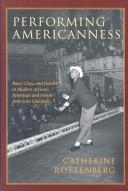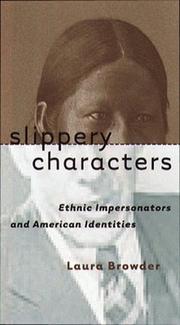Book
ISBN: 1438452292 9781438452296 9781438452272 1438452276 9781438452289 1438452284 Year: 2014 Publisher: Albany, NY
Abstract | Keywords | Export | Availability | Bookmark
 Loading...
Loading...Choose an application
- Reference Manager
- EndNote
- RefWorks (Direct export to RefWorks)
Explores how the trope of racial passing continues to serve as a touchstone for gauging public beliefs and anxieties about race in this multiracial era.
Race in motion pictures. --- Race in literature. --- Passing (Identity) in motion pictures --- Passing (Identity) in literature. --- Passing (Identity) --- American literature --- Identity (Psychology) --- English literature --- Agrarians (Group of writers) --- Motion pictures --- History --- History and criticism.
Book
ISBN: 9781978814592 9781978814608 Year: 2021 Publisher: New Brunswick, New Jersey : Rutgers University Press,
Abstract | Keywords | Export | Availability | Bookmark
 Loading...
Loading...Choose an application
- Reference Manager
- EndNote
- RefWorks (Direct export to RefWorks)
"Mixed-Race Superheroes examines representations of racial mixedness, literal, metaphorical, and symbolic, that take on, challenge, or complicate the stereotypes and romanticization of mixed-race identities and the idea of the superhero. Racial mixedness has long been associated with weakness, abnormality, impurity, transgression, shame, and various pathologies on the one hand, while also ironically connoting genetic superiority, exceptional beauty/physicality and unique potential. In contemporary discussions, this romanticization of racial mixedness is linked to the idea of the mixed-race individual as a kind of savior figure who has unique abilities to free us from racial tensions and divisions. While racial mixedness is now sometimes viewed as a superpower in itself, the origins of superhero stories are much more substantively rooted in the opposed rhetoric and practice of racial purity and white supremacy. In short, racial mixedness and superheroes are both historically and currently linked"--
Comic books, strips, etc --- Passing (Identity) in literature. --- Racially mixed people in literature. --- Racially mixed people --- Superheroes in literature. --- History and criticism. --- Race identity --- Comic books, strips, etc. --- Multiracial people in literature. --- Multiracial people

ISBN: 9781584656821 1584656824 Year: 2008 Publisher: Hanover : Dartmouth college,
Abstract | Keywords | Export | Availability | Bookmark
 Loading...
Loading...Choose an application
- Reference Manager
- EndNote
- RefWorks (Direct export to RefWorks)
American literature --- American literature --- American literature --- Minorities in literature. --- National characteristics, American, in literature. --- Passing (Identity) in literature. --- Race in literature. --- Religion in literature. --- Sex role in literature. --- Minority authors --- History and criticism. --- History and criticism. --- History and criticism.
Book
ISBN: 9780815632023 0815632029 Year: 2009 Publisher: Syracuse, N.Y. : Syracuse University Press,
Abstract | Keywords | Export | Availability | Bookmark
 Loading...
Loading...Choose an application
- Reference Manager
- EndNote
- RefWorks (Direct export to RefWorks)
"Tony Kushner’s award-winning epic play Angels in America was remarkable not only for its sensitive engagement of Jewish-American and gay culture but also for bringing these themes to a mainstream audience. While the play represented a watershed in American theater and culture, it belies a hundred years of previous attention to queer Jewish identity in twentieth-century American literature, drama, and film. In The Passing Game, Warren Hoffman sheds light on this long history, taking up both Yiddish and English narratives that explore the tensions among Jewish identity, queer sexuality, performance, and American citizenship. With fresh insight Hoffman examines the 1907 Yiddish play God of Vengeance by Sholem Asch, the cross-dressing films of Yiddish actress Molly Picon, and several short stories by Isaac Bashevis Singer. He also analyzes the English-language novels The Rise of David Levinsky (Abraham Cahan), Wasteland (Jo Sinclair), and Portnoy’s Complaint (Phillip Roth). Hoffman highlights the ways in which the characters in these canonical texts attempt to "pass" as white, straight, and American in the early and mid-twentieth century. This pioneering work is a welcome contribution to the study of Jewish American literature and culture." --
American literature --- Yiddish literature --- Jews in literature. --- Gender identity in literature. --- Passing (Identity) in literature. --- Theater, Yiddish --- Jews --- Queer theory. --- Jewish authors --- History and criticism. --- History and criticism. --- History --- Identity.
Book
ISBN: 9798890859259 1469659581 1469659573 Year: 2020 Publisher: Chapel Hill : The University of North Carolina Press,
Abstract | Keywords | Export | Availability | Bookmark
 Loading...
Loading...Choose an application
- Reference Manager
- EndNote
- RefWorks (Direct export to RefWorks)
Focusing on the construction and performance of racial identity in works by writers from the antebellum period through Reconstruction, Julia Charles creates a new discourse around racial passing to analyse mixed-race characters' social objectives when crossing into other racialised spaces.
Book
ISBN: 1619258234 Year: 2015 Publisher: Ipswich, Massachusetts : Amenia, NY : Salem Press ; Grey House Publishing,
Abstract | Keywords | Export | Availability | Bookmark
 Loading...
Loading...Choose an application
- Reference Manager
- EndNote
- RefWorks (Direct export to RefWorks)
This compilation of essays takes a closer look at this pivotal point in African American history, as well as its origins, identity, portrayal, of women, and rediscovered authors. This title seeks to offer not only expanded readings of the central themes that have long captivated the attention of scholars across time, but also providing valuable insight into the texts, authors, and critical perspectives too often overlooked.Critical Insights: Harlem Renaissance presents the period of unparallel growth in art and literature from the African American Community, also known as the Harlem Renaissance. With its production of key authors, from Langston Hughes to Claude McKay, among others, the Harlem Renaissance saw the rise in creative endeavors by black artists and writers eager to celebrate the unique characteristics of black life and to challenge the institutionalized racial hierarchy pervasive within twentieth-century American society.These creative thinkers, certainly intellectuals in their own right, used their poetry, short stories, novels, and plays as a vehicle to critique the longstanding issues within society that limited socioeconomic mobility for blacks, while perpetuating startling stereotypes about a community too long oppressed. Because of its undeniable impact in shaping the American cultural imagination regarding blacks and on the larger American literary canon, the Harlem Renaissance has since been heavily studied as the most significant period of artistic as well as cultural development the African American community has ever experienced.
American literature --- American literature --- Harlem Renaissance. --- Race in literature. --- African American women in literature. --- African Americans in literature. --- Passing (Identity) in literature. --- African American authors --- History and criticism. --- History and criticism. --- Harlem (New York, N.Y.) --- Intellectual life
Book
Year: 2018 Publisher: Urbana : University of Illinois Press,
Abstract | Keywords | Export | Availability | Bookmark
 Loading...
Loading...Choose an application
- Reference Manager
- EndNote
- RefWorks (Direct export to RefWorks)
"This volume seeks to theorize and explore the concept of "neo-passing," or the proliferation of passing in the post-Jim Crow moment. Why--in our "color-blind" or "post-racial" moment--is passing still of such literary and cultural interest? To answer this question, chapters in this book focus on a range of passing practices, performances and texts that are part of the emerging genre of what we call neo-passing narratives. Neo-passing narratives are contemporary narratives that depict someone being taken for an identity other than what s/he is considered really to be. That these texts are written, constructed, or produced at a time when passing should have passed reveals that the questions passing raises--questions about how identity is performed and contested in relation to social norms--are just as relevant now as they were at the turn of the twentieth century"--
Book
ISBN: 9781526156013 Year: 2021 Publisher: Manchester : Manchester University Press,
Abstract | Keywords | Export | Availability | Bookmark
 Loading...
Loading...Choose an application
- Reference Manager
- EndNote
- RefWorks (Direct export to RefWorks)
This book is the first full-length study of contemporary American fiction of passing. Its takes as its point of departure the return of racial and gender passing in the 1990s in order to make claims about wider trends in contemporary American fiction. The book accounts for the return of tropes of passing in fiction by Phillip Roth, Percival Everett, Louise Erdrich, Danzy Senna, Jeffrey Eugenides and Paul Beatty, by arguing meta-critical and meta-fictional tool. These writers are attracted to the trope of passing because passing narratives have always foregrounded the notion of textuality in relation to the (il)legibility of "black" subjects passing as white. The central argument of this book, then, is that contemporary narratives of passing are concerned with articulating and unpacking an analogy between passing and authorship. The title promises to inaugurate dialogue on the relationships between passing, postmodernism and authorship in contemporary American fiction.
Roman américain --- Acculturation --- Métissage --- Identité sexuelle --- American fiction --- Passing (Identity) in literature --- Dans la littérature --- History and criticism --- Roman américain --- Métissage --- Identité sexuelle --- Dans la littérature
Book
ISBN: 1781702721 1847793290 9781781702727 9781847793294 9780719082290 0719082293 1847797709 Year: 2010 Publisher: Manchester Manchester University Press
Abstract | Keywords | Export | Availability | Bookmark
 Loading...
Loading...Choose an application
- Reference Manager
- EndNote
- RefWorks (Direct export to RefWorks)
This book is a full-length study of contemporary American fiction of 'passing'. It takes as its point of departure the return of racial and gender passing in the 1990s in order to make claims about wider trends in contemporary American fiction.
American fiction --- Passing (Identity) in literature. --- Ethnicity in literature. --- Gender identity in literature. --- American literature --- History and criticism. --- 21st century --- History and criticism --- Passing (Identity) in literature --- Ethnicity in literature --- Gender identity in literature --- Erdrich, Louise --- Eugenides, Jeffrey --- Senna, Danzy --- Roth, Philip --- Beatty, Paul --- Literature --- Literature: History & Criticism --- LITERARY CRITICISM / American / General --- Literature: history & criticism --- American fiction. --- Louise Erdrich. --- Percival Everett. --- Phillip Roth. --- authorship. --- black subjects. --- identity. --- passing. --- postmodernism. --- textuality.

ISBN: 0807860603 9780807860601 0807825468 9780807825464 080784859X 9780807848593 9798890870827 Year: 2000 Publisher: Chapel Hill University of North Carolina Press
Abstract | Keywords | Export | Availability | Bookmark
 Loading...
Loading...Choose an application
- Reference Manager
- EndNote
- RefWorks (Direct export to RefWorks)
In the 1920's, black janitor Sylvester Long reinvented himself as Chief Buffalo Child Long Lance, and Elizabeth Stern, the native-born daughter of a German Lutheran and a Welsh Baptist, authored the immigrant's narrative I Am a Woman--and a Jew; in the 1990's, Asa Carter, George Wallace's former speechwriter, produced the fake Cherokee autobiography, The Education of Little Tree. While striking, these examples of what Laura Browder calls ethnic impersonator autobiographies are by no means singular. Over the past 150 years, a number of American authors have left behind unwanted
American prose literature --- Autobiography. --- Literary forgeries and mystifications --- Impostors and imposture in literature. --- Difference (Psychology) in literature. --- Identity (Psychology) in literature. --- Passing (Identity) in literature. --- Group identity in literature. --- Ethnic groups in literature. --- Impersonation in literature. --- Ethnicity in literature. --- Self in literature. --- Autobiographies --- Autobiography --- Egodocuments --- Memoirs --- Biography as a literary form --- History and criticism. --- History. --- History and criticism --- Technique --- Difference (Psychology) in literature --- Ethnic groups in literature --- Ethnicity in literature --- Group identity in literature --- Identity (Psychology) in literature --- Impersonation in literature --- Impostors and imposture in literature --- Passing (Identity) in literature --- Self in literature --- History --- Santiago, Danny

 Search
Search Feedback
Feedback About UniCat
About UniCat  Help
Help News
News